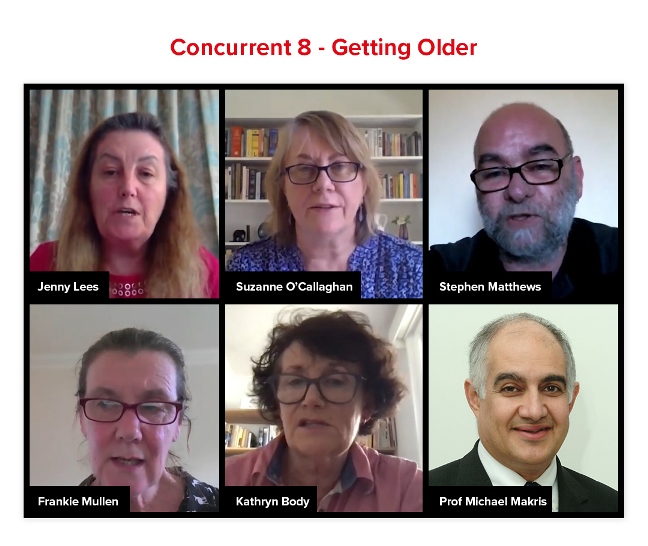SUZANNE O'CALLAGHAN
Suzanne O'Callaghan is HFA Policy Research and Education Manager
Getting older
Chair ~ Jenny Lees
Personal story ~ Zev
Clinical issues with ageing ~ Professor Michael Makris, UK
Getting Older report – results and implementation ~ Suzanne O'Callaghan
Panel Discussion – What are the issues and challenges ahead? ~ Suzanne O'Callaghan, Frankie Mullen, Kathryn Body, Stephen Matthews

With a lively overview of what it means to him to be growing older with severe haemophilia, Zev set the scene for a multidisciplinary session on getting older that focused strongly on quality of life as well as health issues. Zev spoke about family, friendships and motivation, strategies for keeping fit and for maintaining a positive outlook – the power of the peer group. ‘It’s so therapeutic to be with someone where you don’t have to explain,’ was an important aspect for him.

Professor Mike Makris is an international leader in ageing and haemophilia and outlined some key issues from a clinical perspective. He showed the remarkable change in life expectancy for people with haemophilia now – very close now to the general population. He also pointed out that numbers of people with mild haemophilia are much greater than those with severe.
He divided issues with ageing into two categories: issues at the third age or retirement and issues at the fourth age or dependency – where a person can no longer live at home independently. By the fourth age, problems are increasingly non-haemophilia related and may involve hospital admissions. He highlighted the increased prevalence of hypertension, musculoskeletal problems and hepatitis C in older people with haemophilia. He recommended that older people with severe haemophilia consider prophylaxis treatment, presenting data showing bleeds reduced dramatically with prophylaxis.
Bloodborne viruses remain an issue. Sadly, very high proportions of people with haemophilia who acquired HIV have died, but with new highly effective antiviral treatments, for those who live on with HIV, it is now essentially a chronic disease. New treatments offer the potential for a cure for nearly all people with hepatitis C; however, the risk of liver cancer continues for those with cirrhosis and they need regular monitoring.
For older Australians with bleeding disorders, weight management is important as risks for cardiovascular disease are increased with obesity and being overweight can be a higher risk for musculoskeletal problems. They also now need to be aware of the risk for thrombosis, such as heart attack, stroke or atrial fibrillation, which is common in the general population of older people. Usually treated with anticoagulants, it will need careful management in people with haemophilia. Other health conditions of ageing such as cancer or musculoskeletal problems, which would require medical procedures or surgery, need to be managed in liaison with the HTC to prevent bleeding complications. Osteoporosis is also more common in haemophilia. With such a range of problems, an important development in the future will be comprehensive geriatric assessments that include haemophilia specialists in the team.
During the Q&A at the end of his presentation, Prof Makris pointed to a number of current research projects exploring new areas: one in the Netherlands into bleeding-related arthropathy in older people with mild haemophilia and VWD; and some European studies on VWD and rare bleeding disorders, including a EUHASS thrombosis study, a study into whether you can grow out of VWD as you age, and a study to manage specific bleeding complications in some types of VWD.
I then had an opportunity to present the results of the HFA Getting Older report. This was a good springboard for the panel discussion, where we looked at some practical responses to questions that came up in the report and the issues and challenges ahead.
As a haemophilia nurse, Steve Matthews highlighted the challenges for HTCs:
From a psychosocial perspective, Kathryn Body commented:
Issues of ageing are an added complication for physiotherapy management, noted Frankie Mullen. However, this is also an opportunity to collaborate with community physiotherapists so that people can attend local programs for their regular health maintenance.
The panel discussed what makes a good GP for an older person with a bleeding disorder:
For community physiotherapists there were similar criteria:
Keeping up physical activity as they grew older was particularly important for people with bleeding disorders to develop and maintain bone strength and prevent problems such as osteoporosis.
Self-advocacy can be more difficult as you grow older and more frail or develop dementia. Suggestions from the panel included:
With so many new challenges in this area, the experience of the expert presenters in this session provided some really relevant and practical points, both from the perspective of the patient and the HTC. The session wrapped up with encouragement to view the HFA Getting Older Info Hub, where there is information covering many of these new issues.
My thanks to Jenny Lees from HFACT for chairing the session. Jenny has been a valued member of the HFA Getting Older Project Advisory Group and continues to support its work.
Haemophilia Foundation Australia acknowledges the Traditional Owners and Custodians of Country throughout Australia, the land, waters and community where we walk, live, meet and work. We pay our respects to Elders past and present and extend that respect to all Aboriginal and Torres Strait Islander peoples.
Sign up for the latest news, events and our free National Haemophilia magazine